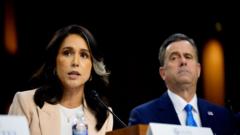US President Donald Trump, along with his intelligence chiefs, has attempted to downplay a major security breach involving a leaked Signal group chat. In this conversation, a journalist inadvertently joined the chat and overheard plans for military airstrikes in Yemen. The government leaders, including CIA Director John Ratcliffe and Director of National Intelligence Tulsi Gabbard, denied that any classified information was disclosed during a Senate hearing, which quickly shifted focus to the leak rather than the initial agenda on drug trafficking.
Defence Secretary Pete Hegseth faced pointed questions regarding the messages, though he did not testify and is considered the key authority on information classification. The incident, dubbed "Signalgate," has resulted in political backlash, with Democrats accusing the administration of incompetence in handling national security.
The journalist, Jeffrey Goldberg, initially thought the chat was a prank, but later confirmed the authenticity of the messages when a military operation was executed. Shockingly, the airstrike resulted in 53 casualties, targeting Houthi rebels aligned with Iran.
Senators raised flags about the reliability of national security under the Trump administration, with some calling the event an "embarrassment" and others stressing the need for a thorough investigation into the compromised communications. Meanwhile, Trump portrayed the controversy as a distraction from his accomplishments, asserting that it was merely a technical glitch when Goldberg was added to the chat.
As this situation unfolds, the implications for operational security and presidential record-keeping laws are under scrutiny, with watchdog groups now involved in legal actions against the officials involved. Critics emphasize that discussing sensitive information on a civilian app is a major security lapse, indicating potential vulnerabilities in national security operations.




















